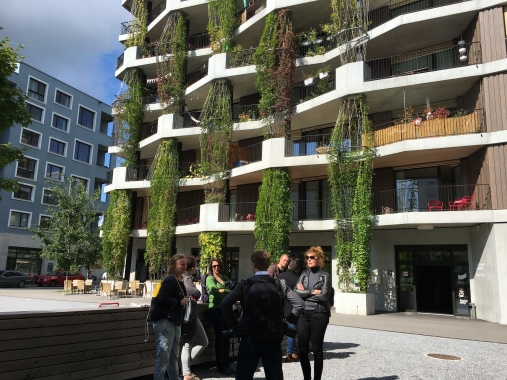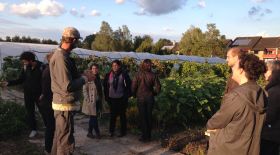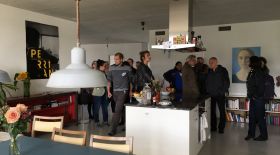It’s all about people at 'More than Housing'
Report from the recent World Habitat Peer Exchange
Zurich, 5 December 2017 | Social
"There is no project that didn't succeed because of lack of finance, it's usually because of people." These are the words of Andreas Hofer, one of the founding members of Mehr als Wohnen housing cooperative in Zurich. This was his reply to concerns raised by a few of the participants at the recent World Habitat Peer Exchange about the financial struggle they’ve had setting up housing cooperatives in their own countries. Andreas's point is that people can accomplish anything by working together. And that's exactly what they've done at Mehr als Wohnen (More than Housing).
By Jelly Moring, Programme Manager at World Habitat
Ten years ago, the local authorities released a piece of land for low cost development housing. The 4-hectare site situated in Hunziker Areal, a former industrial site on the northern edge of the city, presented huge challenges and risks for a single cooperative to develop by itself. However, 50 housing cooperatives in Zurich came together to create More than Housing, one of the largest and most ambitious co-operative housing developments in Europe.
More than Housing is more a district itself than a residential-complex. It is built according to the ‘2000-watt society’ principle, comprising of 13 buildings built to passive house standards with nearly 400 apartments. Over 1200 residents from across society and generations live here. On site there's childcare, a bakery, shops, restaurants, a bed and breakfast and working studios.
The idea was to build housing that meets the needs of the future. ‘How will we live tomorrow?’ inspired the planning and development - from the design to construction; to operation and management of the buildings. Dialogue between the architectural teams, future residents, neighbours, local authorities, founding cooperatives and the wider public encouraged experimentation and inspired new forms of living and working.
The buildings are designed so that neighbours meet and interact in everyday life to foster communal living. We visited cluster apartments – a series of small units with a bed, bathroom and kitchenette that are arranged around large common spaces. This provides residents with their own space as well as the ability to come together and socialise in joint living rooms. There are also large shared community facilities available including a sauna, common restaurant and bar, rooftop terrace, car/bike sharing, laundry rooms, repair and swap shops and a meditation room.
Residents are encouraged to play an active role in organising community life. They can form neighbourhood associations and get funding from the solidarity fund - which all residents contribute to - for community initiatives, such as communal gardens, group classes and swap shops.
We visited other housing cooperatives – Kalkbreite, Kraftwerk and Zwicky-sud – where we saw how the principle of ‘helping people to help themselves’ is rooted in the housing developments through architectural design and processes that foster communal living and participation. The visit also gave us further insight into the very collaborative nature of cooperatives in Zurich. They all worked with other cooperatives to learn from and invest in a project. This culture of learning and exchange is facilitated by a long-held tradition of self-help work and supportive housing policy.
For over a century, housing cooperatives in Zurich have been considered as indispensable in the provision of affordable housing. There is incredible support for not-for-profit apartments from the citizens of Zurich who voted to increase it up to 33% in a 2011 referendum. More than 1 in 4 of all homes are not-for-profit - and most of these are owned by housing co-operatives. Local authorities lease land to cooperatives under favourable conditions, enabling cooperatives to build and operate affordable housing throughout the city.
More than Housing lives up to its name – providing people access to good affordable homes and empowering them to form communities and live a good life. This is good practice that we, in the housing sector, should also live up to.


Leave comments